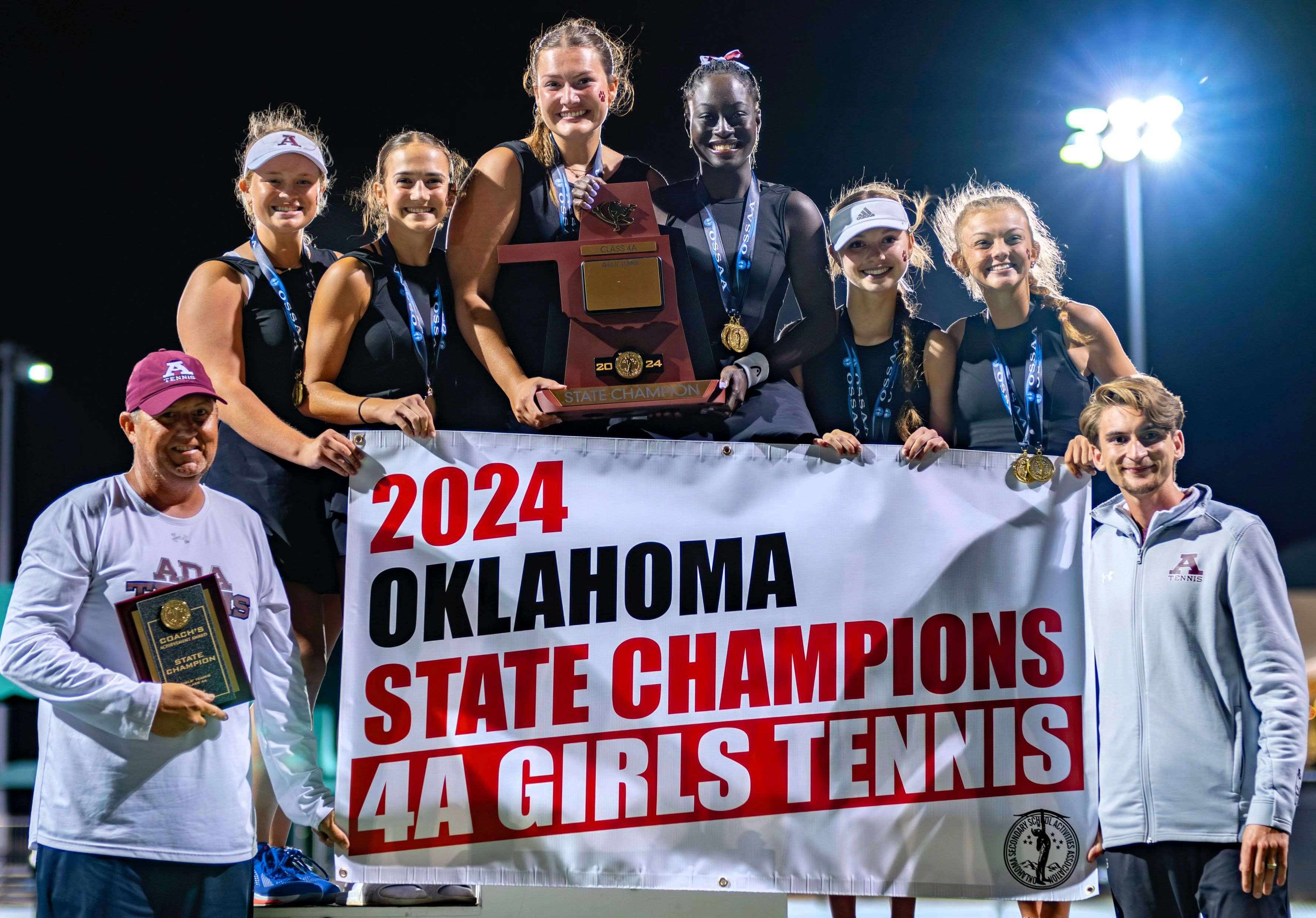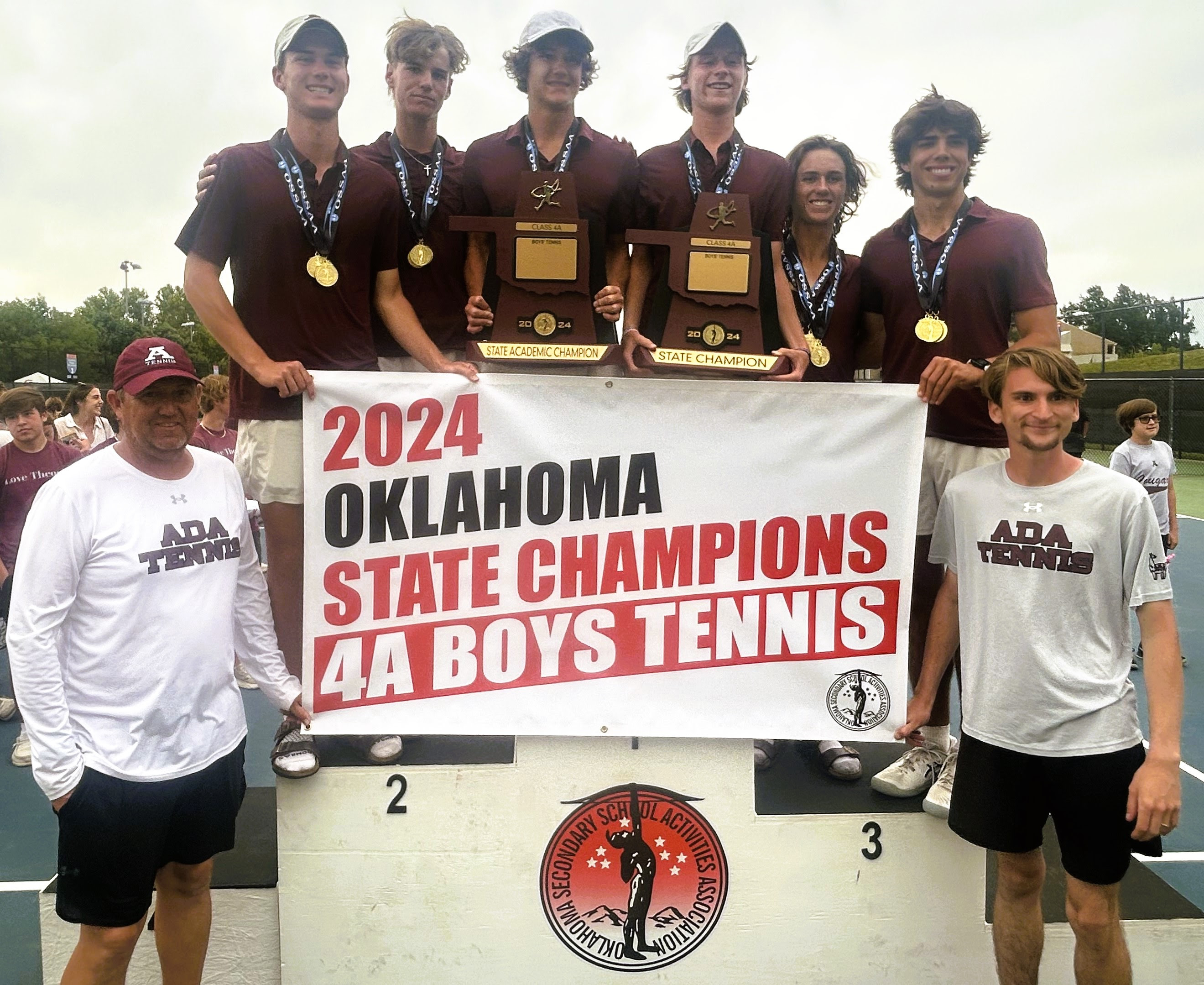
- Details
- By Chickasaw Nation Media
Ada High School’s varsity tennis coach Terry Swopes (Chickasaw) capped off the 2023-2024 tennis season by being named National Coach of the Year by the National Federation of State High School Associations (NFHS). During the season, Swopes led the Ada High School Cougar tennis program in capturing both Division 4A State Boys and Girls Tennis Championship titles.
“Tennis has given me everything in my life,” Swopes said. “It is how I met my wife. It has given me a great family. It’s all come from tennis. I don’t think there is another community that supports their tennis program like Ada, making tennis a great experience.”
The process of receiving the National Coach of the Year award from NFHS is arduous. More than 5,000 applicants are reviewed annually. Trainers selected for the award are the elite high school coaches.

2024 Ada Cougars Boys Tennis team. Pictured from left: Coach Terry Swopes, Tate Danielson, Anthony Towers, Drew Lillard, Halston Redwine, Jackson Swopes, Brady Bacon and assistant coach Noah Watkins. (Photo/Chickasaw Media Nation)
Being named NFHS Coach of the Year begins at the state level. Coaches are presented with the Coach of the Year by local organizations, who then refer them for NFHS regional review. Regional victors continue to NFHS nationals. The NFHS Coach of the Year is selected from the final pool of candidates.
“It feels amazing anytime you can say national in front of an award,” Swopes said. “I am blessed to have players that work so hard. This award is a testament to their amazing season.”
The NFHS is recognized as the leader in high school extracurricular athletics and arts programs. Within 51-member state associations, including Washington, D.C., the NFHS represents nearly 20,000 high schools with a student body numbering more than 12 million young people.
According to NFHS, “Recipients of the Coach of the Year awards must exemplify the highest standards of sportsmanship, ethical conduct and moral character. They must be endorsed by their respective state high school associations. Recipients are selected by the NFHS Coaches Association Awards Committee and approved by the NFHS board of directors.”
With 141 state championships, Ada High School has one of the most respected sports programs in Oklahoma. According to Swopes, he is the latest of a long line of winning tennis coaches produced by the school. Between the boys and girls teams, the Cougar tennis program has brought a total of 26 championship titles to Ada.
“Ada is known in the state for tennis,” Swopes said. “We have an incredible tennis community. Parents, former players and previous coaches continue to be part of the program.”
Swopes has amassed many regional and state championships for the Cougar tennis program. These include 12 state championships, winning three as head coach and nine as assistant. By winning both the boys and girls regionals this year, his record includes seven of these titles as head coach.
“While both teams won their (championship) titles last year, I don’t think I could have written a better script for the boys team,” Swopes said. “They were all seniors. They have been playing together since they were little. This was the first time in Ada history the boys swept every division, including the academic state championship.”
As academic state champions, the boys team had the highest grade-point average of the competing teams.
“We are blessed. Our kids work hard on and off the court. We have won academic state championships many times in the last seven or eight years,” Swopes said.
While the 2023-2024 NFHS Head Coach of the Year award may be Swopes’ most prestigious recognition, it is far from his first. Swopes has been presented with nearly 20 other awards. Swopes has been acknowledged for his coaching skills by the Fellowship of Christian Athletes, Oklahoma Tennis Coach Association and the Oklahoma Secondary School Activities Association.
“If I had to choose my absolute favorite coaching accolade, I would have to say coaching my sons has been the best experience. It didn’t hurt that their teams won state championships,” Swopes said.
Cougar tennis is a family affair. Swopes’ father-in-law, Bill Nelson, is a former Cougar tennis head coach. Coaching at Ada High School has not only given Swopes the opportunity to coach his sons, but a niece as well.
“I happened to marry into a tennis family,” Swopes said. “My family has somehow been involved in winning 20 of the 26 of the school’s state championships in tennis.”
Today, three family members are playing at the collegiate level.
“My son, Jackson Swopes, is playing at Earlham College. My niece, Gracie Epps, is playing at Oklahoma State University, and another niece, Zoie Epps, is playing at Louisiana Tech University.”
In addition to the hard work from the athletes and school administration, Swopes said he believes the Ada tennis program’s reputation stems from the collaboration between the city of Ada, individual community members and the Chickasaw Nation. Each contributes in their own way to the school’s sports program.
Swopes, a Chickasaw citizen, spends time each summer teaching Chickasaw youth the ins and outs of tennis during the Chickasaw Nation’s annual tennis clinic. Swopes has been involved with the tennis clinic for more than 20 years. For the last seven years, Swopes has been the primary organizer of the tennis clinic.
The clinic allows Swopes the ability to meet Chickasaw players ages 8 to 18 from around the country. Swopes enjoys teaching the next generation of Chickasaws the game, giving them a solid foundation to build upon.
“The majority of those who participate in the clinic are new to tennis,” Swopes said. “It’s a great introduction for those who may not have seen the game played before. We had a girl introduced to tennis through the clinic at a young age. She fell in love with the game. She stayed with it and went on to win state for us a few years ago.”
Swopes said he enjoys the group’s varied skill levels. Those new to the game learn basic skills such as the ready position, basic racket grips, the four basic tennis strokes, how to hit volleys and how to serve. More advanced players are placed within their own group
and learn advanced footwork, point strategy and how to play the more complicated game of doubles tennis.
In the past, Swopes has built tennis teams exclusively from Chickasaw players. Swopes has taken these teams to play at special First American tennis competitions, such as the North American Indian Tennis Association Tournament.
“You need to have at least six players to form a team. We have taken Chickasaw teams as far away as St. Louis to play,” Swopes said. “Our latest team had four players from Ada, a couple from Byng and a few from Seminole. They played in an Oklahoma tournament.”
Swopes said he receives his Chickasaw heritage from his father’s side of the family. His family traces their lineage to Lazarus Adkins, an original Dawes enrollee.
“Being Chickasaw gives me a sense of pride,” Swopes said. “It gives me a sense of resiliency. I love being Chickasaw, and I love living in Ada near (the Chickasaw Nation) headquarters. Thinking about my heritage pushes me to do things the right way. Every day, me and my family represent our Chickasaw heritage as best as we can.”
In the Cougar clan
Swopes became involved with tennis at an early age. He learned the game by watching and playing with his father, Donald. His mother is Karen. Swopes played for his hometown’s high school tennis team in Moore, Oklahoma. He continued to play at the collegiate level while attending the University of Central Oklahoma (UCO).
“Tennis has always been part of my life,” Swopes said. “Some of my fondest memories are growing up learning to play tennis from my dad and the time spent with him on the court, and the time spent with my mom on long car rides driving me all over the state to play tennis tournaments.”
Swopes transferred to East Central University from UCO to be closer to his future wife, Sunny. He quickly realized Ada was home.
In addition to coaching tennis, Swopes is the Ada High School senior counselor. He said he enjoys counseling almost as much as coaching.
More Stories Like This
Native News Weekly (August 25, 2024): D.C. BriefsNative Bidaské: The Illusion of Freedom and the Myth of America 250, Leonard Peltier Speaks Out
Monday Morning (March 2, 2026): Articles You May Have Missed This Past Weekend
Native News Weekly (March 1, 2026): D.C. Briefs
Scope Narrowed, Report Withheld: Questions Mount Over Michigan Boarding School Study
Help us defend tribal sovereignty.
At Native News Online, our mission is rooted in telling the stories that strengthen sovereignty and uplift Indigenous voices — not just at year’s end, but every single day.
Because of your generosity last year, we were able to keep our reporters on the ground in tribal communities, at national gatherings and in the halls of Congress — covering the issues that matter most to Indian Country: sovereignty, culture, education, health and economic opportunity.
That support sustained us through a tough year in 2025. Now, as we look to the year ahead, we need your help right now to ensure warrior journalism remains strong — reporting that defends tribal sovereignty, amplifies Native truth, and holds power accountable.
 The stakes couldn't be higher. Your support keeps Native voices heard, Native stories told and Native sovereignty defended.
The stakes couldn't be higher. Your support keeps Native voices heard, Native stories told and Native sovereignty defended.
Stand with Warrior Journalism today.
Levi Rickert (Potawatomi), Editor & Publisher

